10 Best Exercises for Knee Pain, According to Fitness Experts

When you’re suffering from chronic pain, it may seem counterintuitive to use exercise as a means of healing. Yet experts say that as long as you do so carefully and strategically, working out is often exactly what you need to improve your pain or heal from an injury. For instance, knee pain resulting from arthritis, mechanical problems, or past injury can also be improved with the help of gentle stretching, mobility exercises, and toning exercises. Read on for fitness experts’ top recommendations for knee-strengthening exercises.
RELATED: 5 Best Shoes for Knee Pain, Podiatrists Say.
1
Yoga
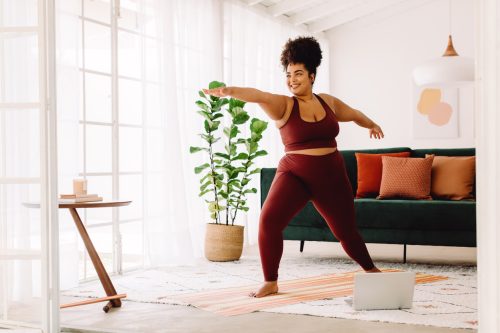
One of the best gentle workouts you can do to improve knee pain is yoga. This is a low-impact activity that strengthens the muscles around your knee joint without the stress of activities like running or jumping, explains Echo Wang, the founder and CEO of Yoga Kawa. She adds that yoga can improve your knees’ stability and flexibility, which can also help prevent future injuries.
“Studies have even shown that yoga can significantly reduce pain from knee osteoarthritis,” Wang tells Best Life. “I recommend focusing on poses done lying down, which minimize pressure on the joints.
“A great example is Savasana, or corpse pose,” she says. “Just lie flat on your back with arms relaxed and breathe deeply. This pose helps your whole body unwind, including your knees. You can hold it for as long as it feels good, focusing on connecting with your breath and letting go of tension.”
2
Half squats
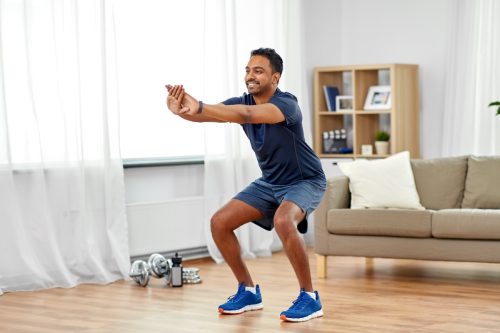
To alleviate and prevent knee pain, it’s important to incorporate a variety of exercises targeting the muscles around the knee, says Josh York, CPT, a certified personal trainer and the founder and CEO of GYMGUYZ.
However, he has one note before getting started: “Always start these exercises gradually and consult with a healthcare professional if you experience persistent or severe knee pain. Consistency in performing these exercises will not only alleviate current knee issues but also support long-term knee health and mobility.”
York recommends performing “half squats to strengthen the quadriceps, glutes, and hamstrings without straining the knees, complemented by calf raises for lower leg muscle reinforcement.”
RELATED: 9 Best Bodyweight Exercises You Can Do Anywhere, Fitness Experts Say.
3
Step-ups
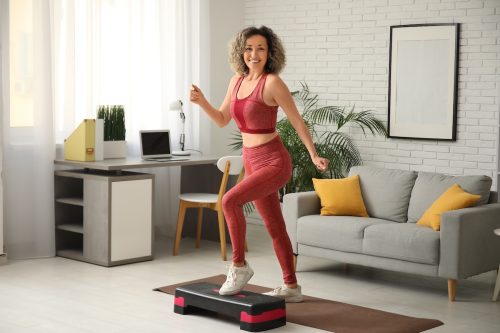
Taking the stairs can strengthen the legs, glutes, and back, and it reduces pressure on the joints. Even better? You can claim these benefits if you have just one step at your disposal.
“For functional strength and balance, include step-ups using a sturdy platform to step up and down alternately, supporting knee stability and strength,” York suggests.
“These exercises, combined with other stretches like calf stretches and dynamic movements such as hamstring curls and leg raises, offer a comprehensive approach to improving knee strength and flexibility, crucial for managing and preventing knee discomfort,” he notes.
4
Lunges and reverse lunges
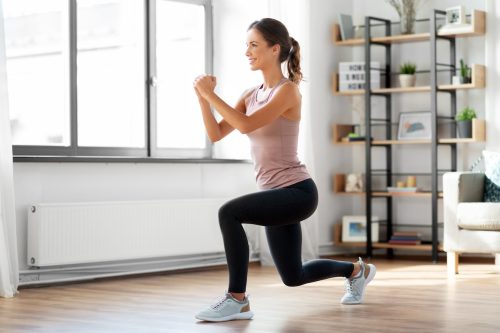
Lunges and reverse lunges are also highly beneficial when it comes to knee pain, helping to “get the knee moving through a full range of motion while building strength in the posterior chain,” according to John Lindala, MS, PES, CPT, a performance enhancement specialist and long-time fitness industry professional.
Be sure to keep your feet at hip width, pointing straight ahead and to have your legs form a 90-degree angle.
“Emphasis should be on a full range of motion and squeezing the glutes maximally when coming to standing,” he advises. “Three sets of 10 to 12 should be done initially, and all the reps completed on one side before switching.”
RELATED: 7 Best Calorie-Burning Exercises That Won’t Hurt Your Back, Fitness Pros Say.
5
Side-lying leg lifts
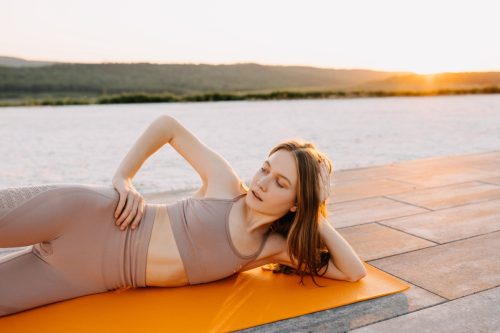
Juanita Franke, a certified Pilates instructor for Club Pilates, shares that she suffered a knee injury for which she required surgery and physical therapy. After experiencing chronic pain, she turned to Pilates.
“My Pilates practice was instrumental in managing my knee pain by increasing movement in the joint itself, which helped improve the range of motion, swelling, and function,” she recalls. “Pilates also helped in strengthening the muscles surrounding the knee, so I could off-load some of the pressure into the joint.”
One simple exercise that offered relief was the side-lying leg lift. To try it, lie on your side with your knees bent, your heels in line with your glutes, and your hips stacked directly on top of each other. Extend your top leg out long, and flex your foot. Lift your leg slightly above your hip and lower back to the starting position.
Franke recommends repeating this exercise eight to 10 times, keeping your leg slightly behind you.
“This exercise strengthens the outside of your leg and hip, helping to stabilize the knee joint and off-load some of the pressure on your knees,” she explains.
6
Pilates footwork
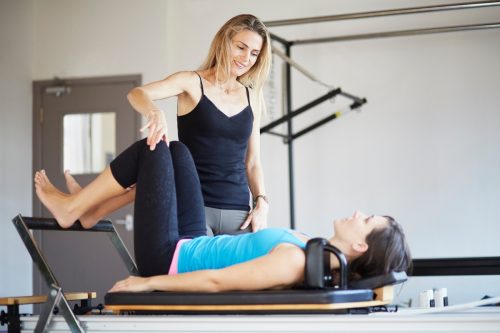
Franke says Pilates exercises that use the Reformer machine can also help alleviate knee pain.
“Start by lying on your back on the Reformer with your heels on the foot bar, slightly narrower than hip-width, with three or four springs on,” the instructor recommends. “Exhale and straighten your legs all the way, finding your full length. Inhale to return the reformer carriage home, maintaining a neutral spine throughout the movement. Repeat this eight to 10 times.”
“Footwork is excellent for working the glutes, hamstrings, and quads as well as alignment of the whole leg. This work improves knee range of motion, gait, and core stability,” she explains.
Franke notes that even if you don’t have access to a Reformer, you can reap similar benefits by standing at a desk or counter and making small squats, keeping your knees in line with your hips and ankles, and staying in a pain-free range of motion.
RELATED: 7 Best Exercises to Improve Your Balance, According to Fitness Experts.
7
Heavy band walks
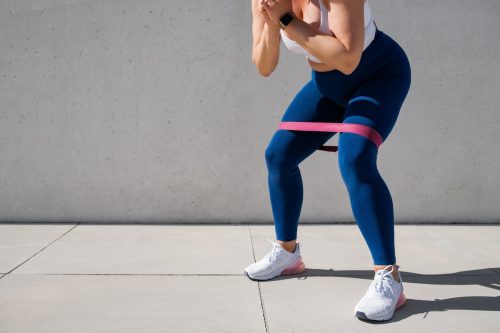
Resistance bands are another great tool for strengthening your knees, says Lindala. He recommends using a high-tension strap and performing lateral band walks (bending your knees slightly and walking sideways), and monster walks (again, bending your knees and keeping your feet hip-width distance while walking forward) to build the muscles in your legs.
Depending on your fitness level and what’s most comfortable, you can place the band across the ankles or across your thighs just above your knees.
“Very little load is applied through the quad, but it will create maximum engagement through the glutes and hips,” Lindala says.
8
Split stance single leg deadlifts
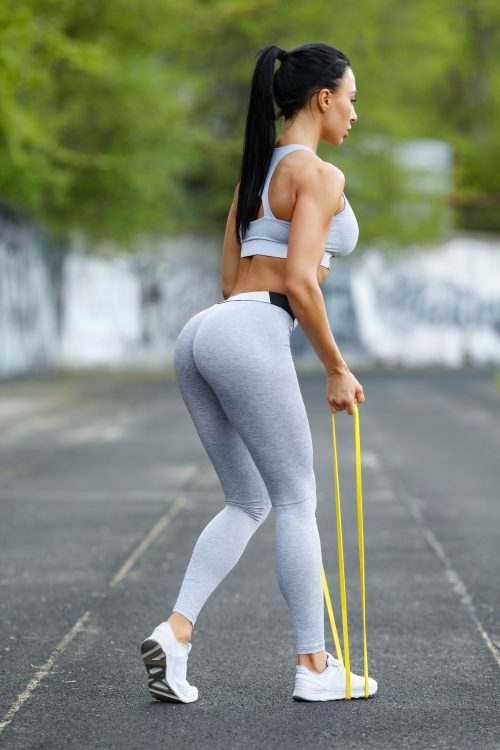
Weight bearing exercises can also help you develop strength in the legs and core, which can lessen knee pain as you build muscle. Split stance deadlifts focus on one leg at a time, addressing the hamstrings, glutes, and quads.
In a video on her website Sweat, personal trainer and author Kayla Itsines demonstrates how to complete this move using light dumbbells (you can also do it without them or with long resistance bands).
Simply stand in a split stance with one foot forward and the other slightly behind you while your feet are hip-width distance apart. While keeping your core braced and driving your hips back, “Hinge forward from the hips and allow the dumbbells to run along the length of your thighs and halfway down your shins,” she instructs. Then, straighten both legs as you come up.
“This exercise will maximize hamstring engagement while reducing the load on the knee,” says Lindala, who recommends doing three sets of 10-12 repetitions per side.
RELATED: Chair Yoga Is the New All-Ages Fitness Trend That Can Make You Look and Feel Younger.
9
Glute bridges
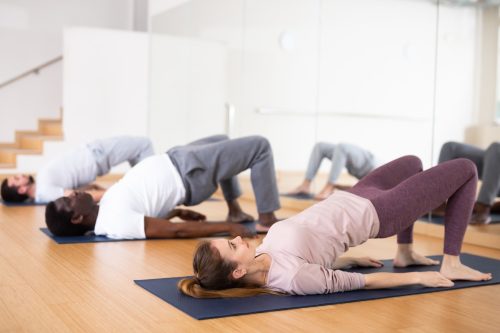
A glute bridge can also help strengthen your legs and promote knee stability, both of which can lessen your pain and prevent future injury.
To try it, start by lying on your back with your knees bent and your feet slightly narrower than your hips, relatively close to your glutes.
“Begin by tilting your pelvis back towards you, and lift your hips off the ground one vertebrae at a time,” Franke says. “Take a breath at the top of the bridge and articulate your spine back to the ground. Repeat this exercise three to five times. Bridging will build strength through the core, glutes, and hamstrings while increasing mobility of the spine.”
10
Hamstring, calf, and heel stretches
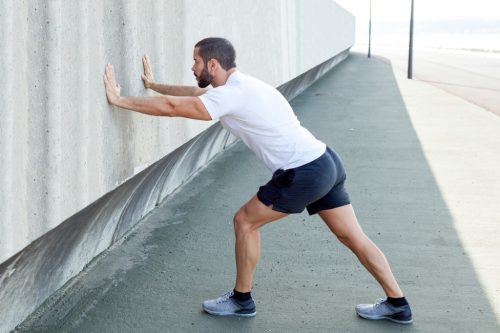
Gentle but targeted stretches are another important form of exercise that can help with knee pain. York recommends stretching the heels and calves against a wall to help loosen lower leg muscles, ultimately improving gait and preventing future injury.
The fitness expert next recommends seated hamstring stretches, in which you extend one leg forward while seated and reach toward the toes. Serving a similar purpose, “leg extensions while seated can effectively strengthen the quadriceps by extending one leg forward and gradually lowering it back down,” he says.